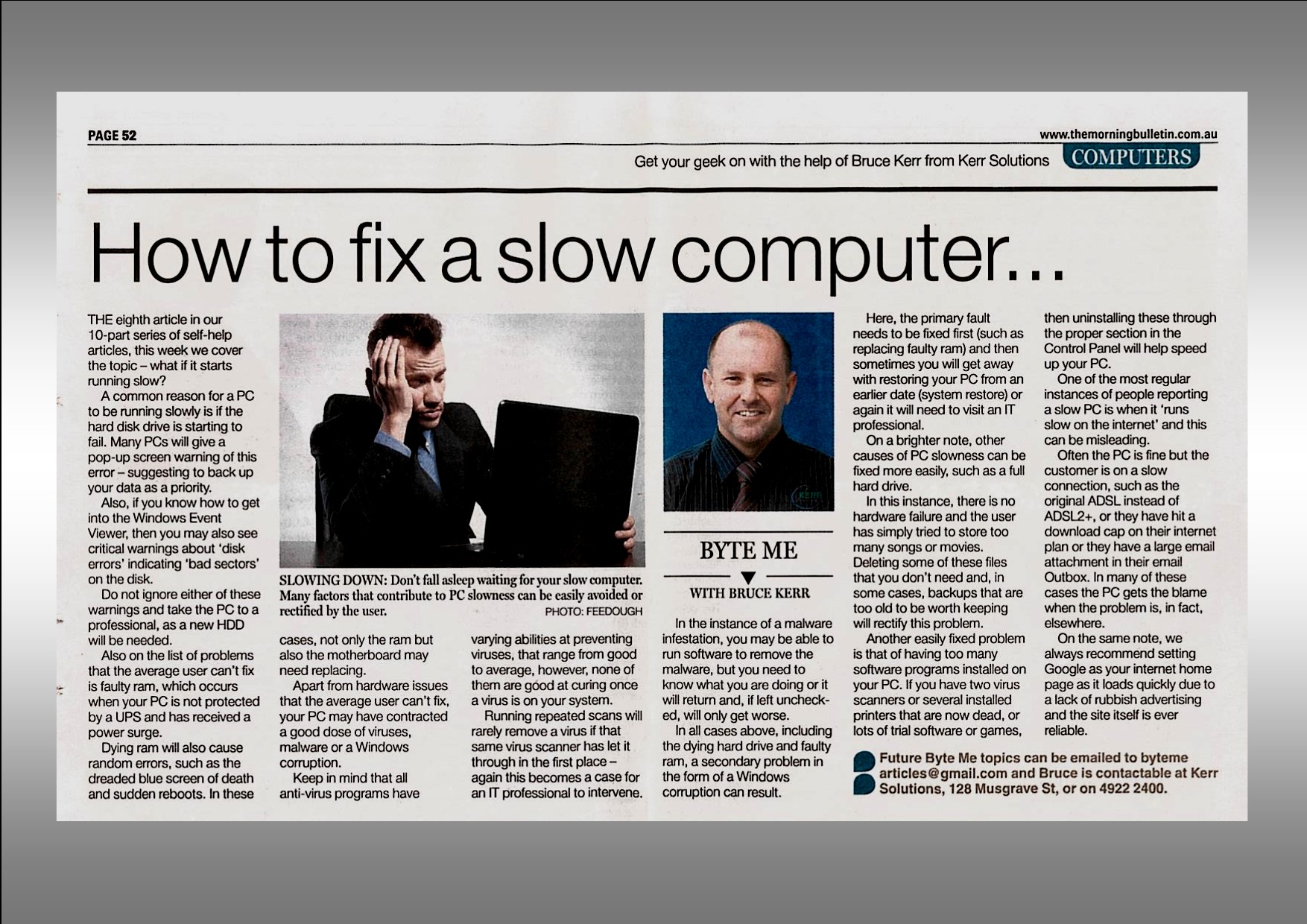How to Fix a Slow Computer…
Part 8 of 10 – Computer Ownership
This article is the eighth of our 10 part mini-series of self-help articles covering all facets of computer ownership. This week we cover the topic – What if it starts running slow? There are many factors that cause or contribute to a PC running slow and for this article I am going to divide them into two separate groups. The first group will be factors that the average user can’t fix themselves, however the second group will list many slowness causes that can either be avoided or rectified by the average user. Now to start with the former group.
A common reason for a PC to be running slowly is if the hard disk drive (HDD) is starting to fail. Many PC’s will give a pop-up screen warning of this error – suggesting to back up your data as a priority. Also if you know how to get into the Windows ‘Event Viewer’ then you may also see critical warnings about ‘Disk Errors’ indicating ‘bad sectors’ on the disk. Do not ignore either of these warnings and take the PC to a professional as a new HDD will be needed.
Also on the list of problems that the average user can’t fix is faulty ram which occurs when your PC is not protected by a UPS (covered in article 4 in this series) and has received a power surge. As an example you may have paid for 8GB of ram but the PC may only be recognising half of it or less. Dying ram will also cause random errors such as the dreaded blue screen of death and sudden reboots. In these cases not only the ram but also the motherboard may need replacing.
Apart from hardware issues that the average user can’t fix, your PC may have contracted a good dose of viruses, malware or a Windows corruption. Keep in mind that all Anti-virus programs have varying abilities at preventing viruses that range from good to average however none of them are good at cure once a virus is on your system. Running repeated scans with a virus scanner will rarely remove a virus if that same virus scanner has let it through in the first place – again this becomes a case for an IT professional to intervene.
In the instance of a Malware infestation, you may be able to run software to remove the Malware but again you need to know what you are doing – or it will return, and if left unchecked it will only get worse. In all cases above including the dying hard drive & faulty ram a secondary problem in the form of a Windows corruption can result. Here, the primary fault needs to be fixed first (such as replacing faulty ram) and then sometimes you will get away with restoring your PC from an earlier date (System Restore) or again it will need to visit an IT professional.
On a brighter note, looking at several causes of PC slowness that can more easily be fixed we have problems such as a full hard drive. In this instance there is no hardware failure and in many cases the user has simply tried to store too many songs or movies. Deleting some of these files that you don’t need and in some cases backups that are too old to be worth keeping will rectify this problem. Another easily fixed problem is that of having too many software programs installed on your PC. If you have two virus scanners or several installed printers that are now dead, or lots of trial software or games then uninstalling these through the proper section in the ‘Control Panel’ will help speed up your PC.
One of the most regular instances of people reporting a slow PC is when it ‘runs slow on the Internet’ and this can be misleading. Often the PC is fine but the customer is on a slow connection such as the original ADSL instead of ADSL2+ or they have hit a download cap on their internet plan or they have a large email attachment in their email ‘Outbox’. In many of these cases the PC gets the blame when the problem is in fact elsewhere. On the same note we always recommend setting Google as your Internet home page as it loads quickly due to a lack of rubbish advertising and the site itself is ever reliable.
So many people suspect their PC of running too slow and often believe it has an evil personality that is forever plotting to frustrate and annoy them. I empathise with this worry, however your PC is simply a machine which is the product of its setup and maintenance. Next week’s topic – when should I replace it?
Future Byte Me topics can be emailed to [email protected] and Bruce is contactable at Kerr Solutions, 205 Musgrave Street or on 49 222 400.
For more advice and assistance from Kerr Solutions, like and follow us on Facebook

